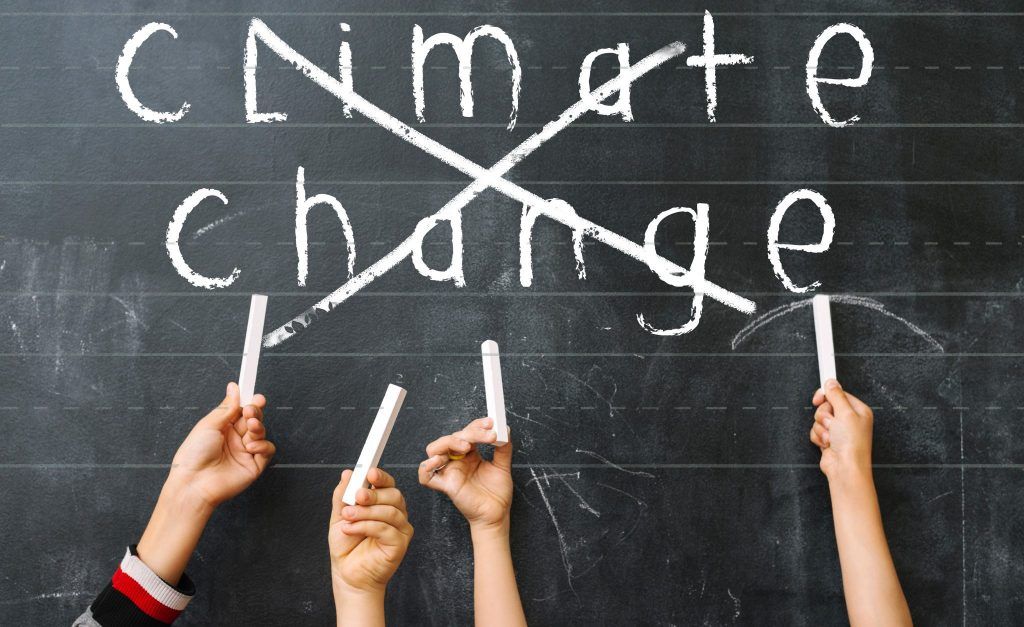Conservative lawmakers have climate change education in their scopes
By Thomas Gaulkin | March 14, 2019
 Illustration: Thomas Gaulkin (chalkboard photo by freepik.com)
Illustration: Thomas Gaulkin (chalkboard photo by freepik.com)
Arizona. North Dakota. Florida. Iowa. South Dakota. Virginia. Montana. Oklahoma. Maine. Connecticut.
No, you’re not back in geography class. Every one of those states recently saw legislation introduced by conservative legislators to hobble efforts to teach climate science in public schools.
Since the midterm elections in November, lawmakers in at least 10 states have introduced multiple measures that either directly or indirectly challenge teaching of climate change in schools. According to the Sabin Center’s Silencing Science Tracker, 15 bills have been introduced since January.
The legislation generally comes in two flavors. One—let’s call it the Fair and Balanced approach—permits, and in some cases, requires educators to teach “both sides” of any “controversial” issue. None of the bills of this type specifies what the controversial issues might be, but some refer to anything that falls within an “electoral party platform at the local, state, or federal level.” Bills proposed in South Dakota and Virginia would have prohibited such “partisan” topics in school outright—and since climate change is a Democratic Party focal point, it would have been banned from the classroom. (Both of those bills died in committee.)
University of Illinois climate scientist Donald Wuebbles told the Associated Press, “You can’t talk about two sides when the other side doesn’t have a foot in reality.” As a reminder, there is overwhelming scientific consensus about the impact of humans on the climate—a fact that nevertheless remains difficult for some to accept.
The other brand of legislation opposes or reverses adoption of statewide Next Generation Science Standards (NGSS)—a curriculum developed by a group of 26 states and well-established organizations like the National Science Teachers Association and the American Association for the Advancement of Science. Connecticut state Rep. John Piscopo was so worried about the scientific corruption of youth that he proposed separate bills both to ban the NGSS standards and to modify them to strike any reference to climate change. (Those bills have since been withdrawn.)
The most brazen effort so far this year came in Montana’s House Bill 418, which tried to make science denial the law of the land:
“The legislature finds:
(a) reasonable amounts of carbon dioxide released into the atmosphere have no verifiable impacts on the environment;
(b) science shows human emissions do not change atmospheric carbon dioxide emissions enough to cause climate change;
(c) claims that carbon associated with human activities causes climate change are invalid; and
(d) nature, not human activity, causes climate change.”
This bill, along with most of those proposed in other states, died in committee. Only one has made it to a full vote. (It didn’t pass.) South Dakota House Bill 1270 declared that teachers could not be “prohibited from helping students understand, analyze, critique, or review in an objective manner the strengths and weaknesses of scientific information presented in courses being taught.” That language—also found in failed proposals in North Dakota and Oklahoma—borrows from the controversial 2008 Louisiana Science Education Act, which critics say undermines the teaching of evolution and continue to try to repeal.
Other shared language in these bills is copied verbatim from a “code of ethics” proposed under conservative activist David Horowitz’s eye. And a recent commentary in Horowitz’s main publication, FrontPage Magazine, bemoans legislation by Massachusetts Senator Ed Markey in support of climate change education. As the author sees it, that bill’s cosponsors would be happy to force teachers into “leftist re-education camps” where they can learn to “indoctrinate K-12 schoolchildren in a radical unscientific agenda on the purported risks of ‘climate change.’”
These attempts to make science into just another ideology are worrying, but not quite as scary as the anchorless reality that Florida state Sen. Dennis Baxley—sponsor of one of those Fair and Balanced bills mentioned earlier—seems to live in. “There is really no established science on most things, you’ll find,” he said.
Publication Name: Associated Press
To read what we're reading, click here
Together, we make the world safer.
The Bulletin elevates expert voices above the noise. But as an independent nonprofit organization, our operations depend on the support of readers like you. Help us continue to deliver quality journalism that holds leaders accountable. Your support of our work at any level is important. In return, we promise our coverage will be understandable, influential, vigilant, solution-oriented, and fair-minded. Together we can make a difference.
Topics: Climate Change
















Incredibly irresponsible actions by the conservatives. This is likely done for two main reasons, one is that their financial revenue is generated by their fossil fuel supporters (in some cases the politicians themselves are in the fossil fuel business) and the second is that the Republican party has almost no future due to their actions vis a vis efforts to tackle anthropogenic climate change. The young people of this century do not seem to appreciate Republicans as a whole and will likely drive the party to extinction or at least relative irrelevance in the coming decades assuming that there is… Read more »
Just sent an invite to meet/debate Rep. John Piscopo on his CT proposals. As I have been teaching the science of global warming and the resultant climate change for over 30 years now. We shall see if he takes me up on my offer.
Even Connecticut?! Those other states I can understand, but isn’t Connecticut supposed to be one of the more educated and forward-thinking states in the US?